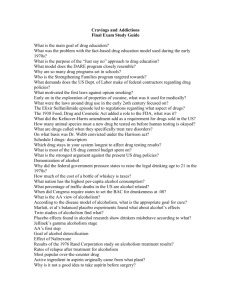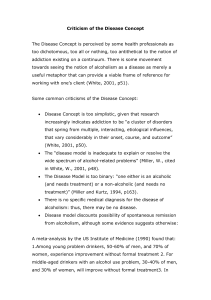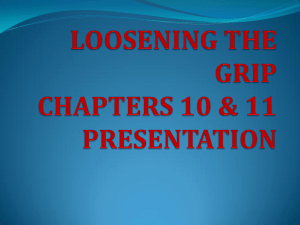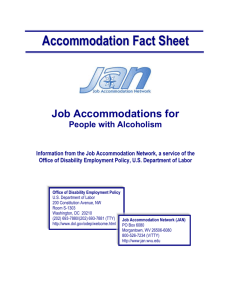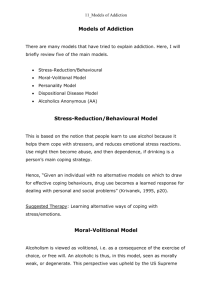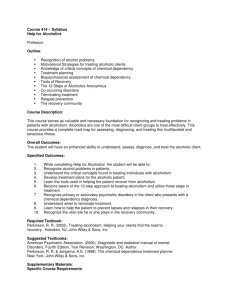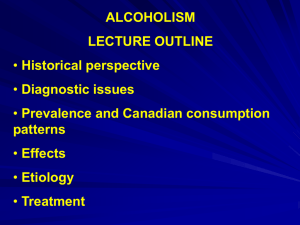Schmidt_LP1_OnCampusTalkAboutAlcohol
advertisement
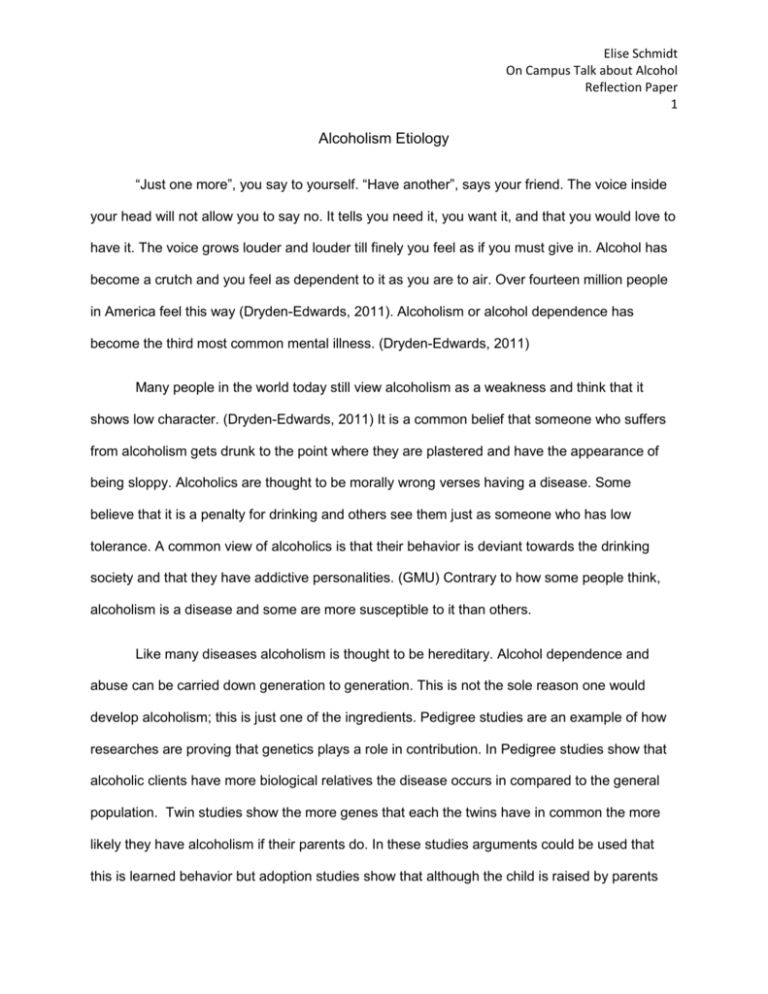
Elise Schmidt On Campus Talk about Alcohol Reflection Paper 1 Alcoholism Etiology “Just one more”, you say to yourself. “Have another”, says your friend. The voice inside your head will not allow you to say no. It tells you need it, you want it, and that you would love to have it. The voice grows louder and louder till finely you feel as if you must give in. Alcohol has become a crutch and you feel as dependent to it as you are to air. Over fourteen million people in America feel this way (Dryden-Edwards, 2011). Alcoholism or alcohol dependence has become the third most common mental illness. (Dryden-Edwards, 2011) Many people in the world today still view alcoholism as a weakness and think that it shows low character. (Dryden-Edwards, 2011) It is a common belief that someone who suffers from alcoholism gets drunk to the point where they are plastered and have the appearance of being sloppy. Alcoholics are thought to be morally wrong verses having a disease. Some believe that it is a penalty for drinking and others see them just as someone who has low tolerance. A common view of alcoholics is that their behavior is deviant towards the drinking society and that they have addictive personalities. (GMU) Contrary to how some people think, alcoholism is a disease and some are more susceptible to it than others. Like many diseases alcoholism is thought to be hereditary. Alcohol dependence and abuse can be carried down generation to generation. This is not the sole reason one would develop alcoholism; this is just one of the ingredients. Pedigree studies are an example of how researches are proving that genetics plays a role in contribution. In Pedigree studies show that alcoholic clients have more biological relatives the disease occurs in compared to the general population. Twin studies show the more genes that each the twins have in common the more likely they have alcoholism if their parents do. In these studies arguments could be used that this is learned behavior but adoption studies show that although the child is raised by parents Elise Schmidt On Campus Talk about Alcohol Reflection Paper 2 without alcoholism the child is still at risk. This also goes vise versa, which a child raised by parents with alcoholism is not necessarily going to be dependent on alcohol. (NIAAA, 2005) Alcoholism is viewed as an oral fixation and ego malfunction. The psychoanalytic model is the belief that it is used to escape from your feelings and the world. The behavioral model supports the thought that alcoholism is learned. Cognitive model supports that persons’ thoughts and beliefs influence whether a person sees alcohol as a positive or negative reinforce. Social learning model is the idea that alcoholism is the failure to cope without alcohol use. Alcohol expectancies is a new study with the theory that the intake of alcohol increase sexual arousal or tension reduction. (NIAAA, 2005) The environment that someone grows up in needs to be taken into consideration; if a father drinks a lot and becomes violent that will not always lead to the child repeating the acts that they witnessed or experienced growing up. In the family alcohol could be used to stabilize the family structure. The most commonly thought of a social situation is a person’s peers. They are thought to be the start or the plateau effect. The environment that you are in can enforce your peers or open your biological or psychological reasoning for dependence. Alcoholism is not caused by one thing alone. (Reaves, 1964) There are biological, psychological, and social causes that melt together to cause one result. It could be a gene passed down, a way to cope with the world, or an act that started out innocently by the world around you. Everyone is susceptible to this disease and the ones that struggle with this day to day are not weak or people that cannot hold their liquor. Elise Schmidt On Campus Talk about Alcohol Reflection Paper 3 Reference Page Dryden-Edwards, R. (2011, June 1). Alcohol Abuse and Alcoholism. Retrieved from MedicineNet: http://www.medicinenet.com/alcohol_abuse_and_alcoholism/page3.htm#what_is_alcoholism GMU. (n.d.). "EXPLANATORY MODELS OF 'ALCOHOLISM' AND/OR 'ADDICTION". Retrieved from http://www.gmu.edu/resources/facstaff/facultyfacts/1-1/models.html NIAAA. (2005, March). Module 2: Etiology and Natural History of Alcoholism. Retrieved from NIAAA: http://pubs.niaaa.nih.gov/publications/Social/Module2Etiology%26NaturalHistory/Module2.ht ml Reaves, L. E. (1964). Concepts in the etiology of alcoholism. Journal of Chronic Diseases Vol. 17 Issue 6, 551-556.
